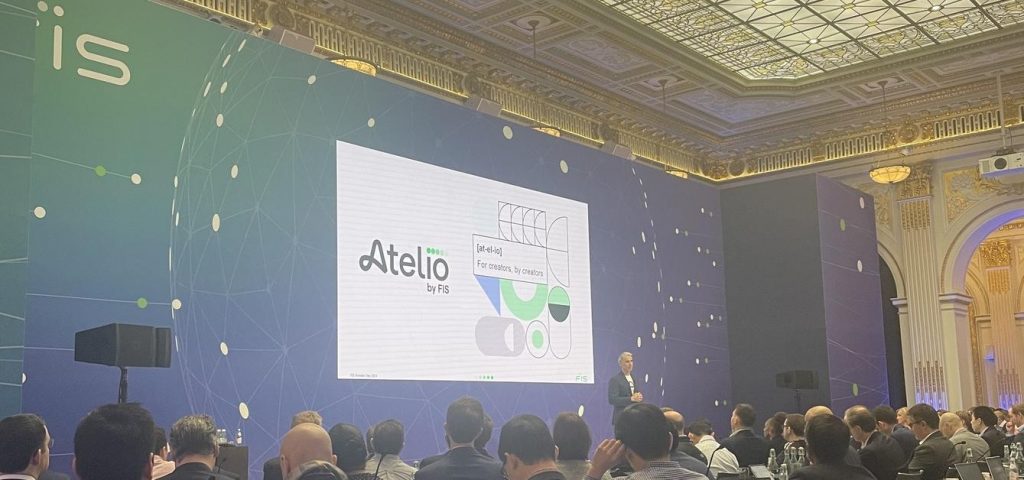Jacksonville, Florida’s FIS Global, a 56-year-old financial technology provider for banks, has launched a new platform called Atelio to help its regional bank clients offer modernized financial products like deposit accounts and online invoicing to other businesses. For regional banks trying to survive in the digital age, an increasingly popular strategy is to partner with nonbanks, enabling them to offer financial products, a trend FIS is trying to ride with its new Atelio software.
“The threat that the banks are facing is if they can’t offer quick, nimble ways for people to embed and open accounts, they’re going to lose out on those customers,” says Tarun Bhatnagar, president of platform and enterprise products at FIS. “There’s an existential threat and there’s also an existential opportunity.”
In the past two years, 250 banks in the United States have shuttered, Bhatnagar noted in his presentation at FIS Investor Day on Tuesday. The consolidation in U.S. banking has continued as the Federal Reserve’s aggressive interest rate increases over the past two years have left smaller banks in a challenging position as they sit on unrealized losses on their bond portfolios. Additionally, deposits are leaving regional banks as consumers turn to alternatives like high-yield savings accounts, commercial deposits or money market funds. In order to retain deposits and stay competitive in an increasingly digital world, FIS bank clients say they need to modernize their product suites and offer sleek tech-like experiences consumers will gravitate towards, Bhatnagar added.
Atelio’s public launch partners include Cleveland, Ohio-based KeyBank, student loan startup College Ave and healthcare payments company RoyalPay. KeyBank is using Atelio to offer an account management platform for commercial clients to keep track of sub-accounts they may have across their organization; College Ave uses the platform for its Ambition Card, a secured credit card for college students to build credit; and RoyalPay uses Atelio to offer pay-by-bank, a payment method where a customer pays a bill directly from his or her bank account to the merchant’s account. FIS plans to continue expanding the products available through Atelio to eventually include everything from mortgage lending and brokerage accounts to treasury accounts, Bhatnagar says.
As the pressures on the banking industry have mounted, regionals have jumped at the opportunity to partner with fintechs as a method for acquiring new customers and deposits through digital means, instead of relying on traditional brick-and-mortar branches. However, acting too quickly has landed some in hot water with regulators skeptical of the burgeoning industry. Blue Ridge Bank, Cross River Bank, Sutton Bank and Piermont Bank, among others, have all been subject to regulatory enforcement actions from the FDIC accusing them of loose oversight of their fintech partnerships over the past two years. FIS, a publicly traded company with a market cap of $46 billion, believes that its long history as a technology vendor to banks will allow it to avoid a similar fate. Year-to-date FIS Global’s NYSE-listed shares have climbed 21% versus around 9% for the S&P 500.
“The reason why FIS is in the best position to win is because in the end embedded finance is banking, and FIS has been in the industry of serving banks for five decades,” Roy Ng, chief business officer of platforms and enterprise at FIS, says.
In addition to helping its regional bank clients offer digital-first products, FIS aims to enable nonbanks including retailers, software developers or neobanks like Chime or Monzo to offer financial products to their end customers through Atelio. The trend of nonbanks offering financial products is referred to as embedded finance. It’s often enabled by banking-as-a-service providers that help connect nonbanks to the technology and banking partners necessary to offer products like buy-now, pay-later loans, deposit accounts or debit cards.
FIS’ platform will compete with close competitor Fiserv’s slate of embedded finance products including debit card issuing and point-of-sale lending. Sunil Sachdev, head of embedded finance at Fiserv, says that in the digital age, financial institutions will need to move beyond a reliance on their own brand and community ties to bring in new customers.
“The next generation prefers consuming and being able to leverage financial services from the brands that they already engage with today,” Sachdev says. “They’re not making a big distinction between a brand offering a debit card versus a financial institution offering that debit card.”
As one of the largest payment processors in the United States, Fiserv has direct relationships with merchants across the country, which it can use to cross-sell embedded finance capabilities. Although FIS sold its processing business, WorldPay, to private equity firms at the start of the year, it still plans to leverage its close relationship with the company to sell Atelio products to merchants.
FIS’ competition doesn’t end with Fiserv. It will also face banking-as-a-service startups like Unit or Synctera, as well as newer companies that provide these services and have bank charters, like Lead Bank and Column. Additional competition comes from payment processors expanding their services to help merchants launch financial products. TabaPay, for example, plans to help its merchants offer an expanded suite of financial products including buy-now, pay-later loans or secured credit cards by acquiring the lending and brokerage licenses of bankrupt banking-as-a-service startup Synapse. Similarly, Marqeta offers card issuing services to the businesses for which it processes payments.
Despite a website that brandishes its proven credibility as a fintech, 56-year-old FIS doesn’t have a reputation for having the most flexible technology or the polished design of its startup competitors. Atelio is the company’s attempt to match the tech-forward experiences that clients and consumers alike are coming to expect.
“Most enterprise software companies with our heritage were built in a more monolithic way, that is just how this technology was built,” FIS’ Ng says. “With the launch of Atelio, we are bringing a speed and flexibility that hasn’t been seen in this market.”

